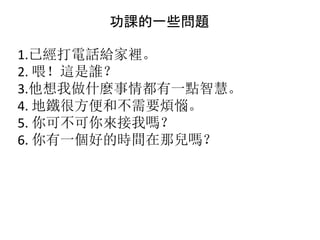
Lesson 10 2
- 1. 功課的一些問題 1.已經打電話給家裡。 2. 喂!這是誰? 3.他想我做什麼事情都有一點智慧。 4. 地鐵很方便和不需要煩惱。 5. 你可不可你來接我嗎? 6. 你有一個好的時間在那兒嗎?
- 2. V1 (以後)就 V2 (了) “吃過飯以後, 我們就動身了” • 他拿了錢(以後)就去學校了。 • 他上完課(以後)就回家了。 • 我吃過飯以後就睡覺了。
- 5. (3) V 了 + quantifying object When the object of a verb is quantified by a number, the use of 了 is required. 1. 我昨天學了五個中國字。 I studied five Chinese characters yesterday. 2. 他去了三個國家。 He went to three countries. 1. I drank five bottles of beer 2. I ate two apples at home yesterday. 3. I read a book. 4. Today I did a lot of things 5. He bought one sandwich. 6. I studied two years of Chinese.
- 6. (4) 到 + time(place) word + 才 + V 到 ‘to arrive’ is a destination marker. It can be followed by a place word or a time word. If 到 is followed by a time word, it usually implies lateness. This structure is often used with the adverb 才. 1. 他到考試的前一天晚上才念書。 He does not study until the night before a test. 2. 他到沒有乾淨衣服穿的時候才洗衣服。 He does not do laundry until he has no clean clothes to wear. 1. He did not wake up until 11 am. 2. He did not study Chinese until he arrive in China. 3. He did not go to high school until 18 years old. 4. They did not get marry until 30s(多). 5. She did not learn to drive until she arrives in the U.S.
- 7. (4) 才 V and 就 V 了 The two adverbs 才 and 就 can be used in one sentence to contrast an action completed later (or in longer time) and an action completed earlier (or in shorter time.) The first clause is: Subject +later time (longer time) + 才 + V. The second clause is: Subject + earlier time (shorter time) + 就 + V + 了. 了 is required in the 就 clause but not in the 才 clause. 1. 我八歲才上小學,他六歲就上小學了。 I did not go to first grade until I was eight; he started his first grade at six. 2. 那本書我看了三天才看完,他看了三個鐘頭就看完了。 I spent three days reading that book while it only took him three hours to finish reading it. 3. He went to college when he was only 16. He did not go to college until 20.